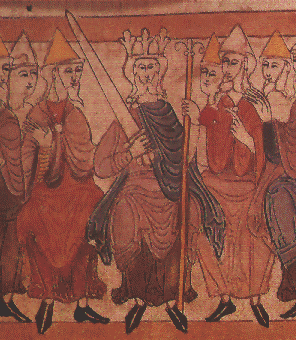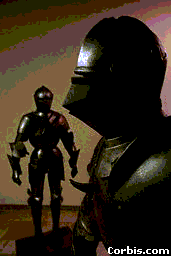 Hey! What's going on here?!
Hey! What's going on here?!The title of the passage "BEOWULF ATTACKS THE DRAGON" doesn't leave much to our imaginations. The passage begins with Beowulf, King of the Geats, boasting to his men outside of the dragon's lair how he must slay the dragon that has been ransacking his kingdom. Beowulf states, "I would rather not use a weapon if I knew another way to grapple with the dragon and make good my boast as I did against Grendel in the days gone by" (Norton 86). He states to the men that they must remain at the entrance to the cave because he will face the dragon alone in order to defend his honor. Beowulf also declares that he will win the gold that is being protected by the dragon for his kingdom. After Beowulf prepares for battle by dressing in his war-shirt and helmet, he goes down under the crag to the entrance of the dragon's lair: "Then he gave a shout. The lord of the Geats unburdened his breast and broke out in a storm of anger" (Norton 86). As a result, the dragon emerges from his lair and pours forth a hot battle-fume of fiery breath. Beowulf is protected by his metal shield, a rarity at the time; most of the other warriors' shields are constructed of wood. At the sight of the dragon, the eleven warriors Beowulf has brought with him retreat in a cowardly fashion.
Wiglaf, a loyal kinsman of Beowulf, will now enter battle for the first time to test his strength as a warrior by assisting Beowulf to defeat the dragon. Wiglaf, at the sight of Beowulf's warriors departing, states "I remember the time when mead was flowing, how we pledged loyalty to our lord in the hall, promised our ring-giver we would be worth our price, make good the gifts of the war-gear, those swords and helmets, as when his need required it" (Norton 88). This expresses Wiglaf's utter disgust with the cowardliness of the retreating men. Wiglaf assures Beowulf that he will stand by his side in battle by stating: "Go on, dear Beowulf, do everything you said you would when you were still young and vowed you would never let your name and fame be dimmed while you lived. Your deeds are famous, so stay resolute, my lord, defend your life now with the whole of your strength. I shall stand by you" (Norton 89). After these words are spoken, the dragon unleashes its fiery breath and chars the wooden shield of Wiglaf.
Inspired by Wiglaf's words, Beowulf raises Naegling and strikes the dragon on the skull. Beowulf attempts to slay the dragon with his sword, but the dragon is immune to the warrior's blade, and Beowulf finds himself trapped in the vicious monster's grip. The dragon then bites Beowulf in his neck and spits venomous poison into the brave warrior's body. Wiglaf stabs the dragon in his belly. Beowulf draws a dagger and stabs the dragon in his flank. The dragon dies. As the deadly poison runs through Beowulf's body, he "…discovered…[it] suppurating inside him, surges of nausea, and so, in his wisdom, the prince realized his state and struggled toward a seat on the rampart" (Norton 90).
At this moment, Beowulf realizes that his life is coming to an end. Wiglaf, seeing the king's despair, unclasps his helmet and begins to wash the fatal wounds of his lord. This is a reference to Christianity as the Lord Jesus had his wounds washed after being crucified. Beowulf asks Wiglaf to bring him the treasure that the dragon had guarded, that he has sacrificed his life for. The riches brought forth from the cave are astonishing. The glittering gold spread across the ground includes goblets, vessels, helmets, arm bands, and a gold standard. As Wiglaf brings the treasure to his lord, who is bleeding profusely, he again begins to swab his body.
Despite the king's mortal wounds, Beowulf utters "To the everlasting Lord of all, the King of glory, I give thanks that I behold this treasure here in front of me, that I have been allowed to leave my people so well-endowed on the day I die" (Norton 91).
Beowulf instructes Wiglaf to have his troops build a grand barrow in his honor. Beowulf then unclasps the gold collar, which he wears around his neck and places it on the neck of Wiglaf, stating that "You are the last of us, the only one left of the Waegmundings. Fate swept us away, sent my whole brave high-born clan to their final doom. Now I must follow them" (Norton 92). These are the last words of Beowulf, the great warrior. He will now be placed upon the pyre. This great mythological character will live on in history.

In the passage Beowulf refers to God, ruler of the Christian Religion three times. The first part is at line 2650, Beowulf states, "As God as my Witness" (Norton 89). In this excerpt Beowulf is referring to God directly, which is clearly a Christian Element. The second part can be found at line 2741, Beowulf states, "The Ruler of mankind" (Norton 90). Finally the last Christian Element is found on line 2795, Beowulf states, "To the everlasting Lord of all, to the King of Glory," (Norton 91).